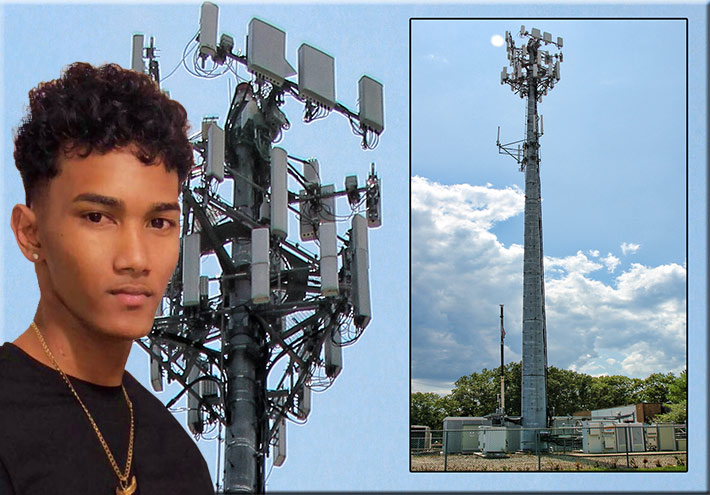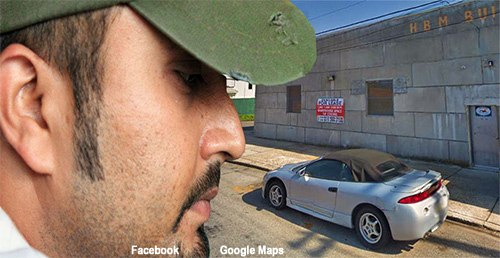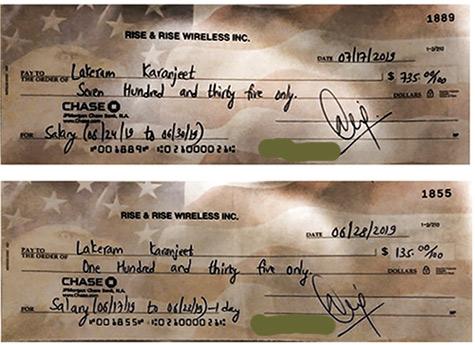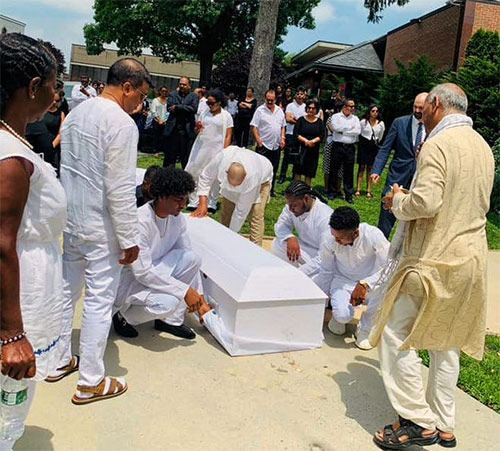
Lakaram Karanjeet was working part-time for Rise & Rise Wireless, Inc. while he was in high school. He died on June 28, 2019 when he fell from this New Jersey 150-foot monopole.
|
An investigation by Wireless Estimator into a lawsuit brought against multiple defendants exposes a wireless construction contractor that had no safety programs in place, few owned assets and a cancelled general liability insurance policy but was able to land multiple AT&T projects until an untrained high school tower climber fell to his death at the above New Jersey site in 2019. The company’s owner closed his doors and skipped town, leaving behind the deceased’s grief-stricken parents demanding answers. Rise & Rise Wireless, Inc.’s defense, in part, says it was the part-time 18-year-old tech’s fault for ignoring its safety guidelines, commonplace rules that OSHA, after investigating, identified were never in place. |
After 18-year-old Lakaram Karanjeet of Jamaica, N.Y. died when he fell from about the 140-foot level of a 150-foot monopole in West Creek N.J., just off the Garden State Parkway on June 28, 2019, his estate sued his employer, Rise & Rise Wireless, LLC; AT&T Mobility, LLC; turfing vendor Jacobs Telecommunications, Inc.; and KBM Associates, LLC, the owner of the tower, on May 9, 2020, with a slightly amended complaint on October 1, 2020.

Life was good. It was a pre-COVID-19 world and Lakaram Karanjeet was looking forward to his senior year in high school, with a little cash in his pocket from working long days as a tower climber. Unfortunately, it’s alleged that his employer never provided him with competent climber training and instruction to never tie off to a T-arm and he fell to his death when a pipe inverted on a 150-foot monopole while he was working on an AT&T installation.
In answering the Superior Court of New Jersey complaint, the defendants denied the allegations.
Rise & Rise, however, said in their response that it was Karanjeet who was at fault since “the plaintiff’s own acts and/or omissions were the sole proximate cause of the happening of the subject accident.” They also alleged that the junior high school student’s estate is barred from recovery because his death was caused by his “own negligent conduct and/or assumption of the risk.”
Uncooperative claim isn’t borne out in OSHA investigation
Rise & Rise, located in Queens Village, N.Y, said that Karanjeet was an uncooperative worker and “he failed to follow and/or heed warnings, directions, commands and/or cautions at and/or around the time of his accident,” although that was never identified by Karanjeet’s supervisor or co-workers interviewed during OSHA’s investigation.
Rise & Rise is demanding a jury trial if Karanjeet’s complaint isn’t dismissed, and its costs and attorneys’ fees to be paid for by the estate.
Employee misconduct, which can be used as defense against an OSHA violation if the employer can provide a sound written safety policy, adequate training, rule enforcement verification, and routine discipline for violations, requires a higher burden of proof in a civil action.
Rise & Rise’s defense might be framed showing that Karanjeet’s negligence was a far more significant cause of his death since he had safety training, was a competent climber and wasn’t following company guidelines, and his conduct was so significant, or so faulty, as to warrant the complete denial of relief.
However, an OSHA report reviewed by Wireless Estimator paints a pathetic picture of the company’s lack of training in fall prevention that appears to have been the primary cause of death.
An OSHA compliance safety and health officer (CSHO) said that on the date of accident, there were six employees on-site working on an AT&T antenna installation project.
Karanjeet and a lead technician were in a JLG 1850SJ telescoping boom lift. The lead was working from the lift, and Karanjeet climbed onto the tower and antenna mounts, but none of the crew observed the events leading to his death.
The CSHO said that Karanjeet’s harness was in very good condition and the straps showed very little wear or abrasion. All snaphooks appeared in new condition and were the locking type.
The CSHO noted that there was no evidence that the harness, snaphooks or attachments had at any time been subjected to any type of fall arresting forces, indicating that Karanjeet was not properly tied off when he fell.
The CSHO reported that he had met with two Jacobs representatives at the scene, and they informed him that Rise & Rise was a vetted contractor. The representatives said that an aerial lift was on-site due to the T-bar mounts that were being used in lieu of working type platforms.
They said it was not their practice to be on-site, but Jacobs does have a spot inspection program for QC and safety.
Jacobs allegedly cited Rise & Rise for previous rooftop violation
Jacobs Operations Manager Stephen Collins said he could not remember any past issues with Rise & Rise and the company had been inspected in the past, but not at the West Creek site. He said it was generally his perception that the establishment had a good work reputation both for quality and safety, according to the CSHO.

Rise & Rise Wireless, Inc. listed its company’s office at this location at 218th St. in Queens Village, NY. The company’s president is Navraj Acharya, above. He has exited the industry and is reportedly working in Texas as an independent filmmaker.
Yet, Rise & Rise owner/partner Navraj Acharya later informed the CSHO that Jacobs Engineering does jobsite audits and that at one audit in the recent past, there was an issue with Karanjeet not being properly tied off on a roof.
Acharya said this incident happened sometime around April and he had an email from Jacobs documenting it. He advised that the incident resulted in a verbal warning and retraining for the issue.
The CSHO followed up with Collins five days later regarding Karanjeet’s safety violation, and he said he was unaware of it and added that any violation related to “free climbing or total lack of fall protection” on a project would have come to his attention.
He said that violations of that nature would have resulted in the employee and potentially the supervisor and entire crew being prohibited from working on Jacobs’ projects.
In an OSHA interview two days later with the lift operator, the technician informed the CSHO that Karanjeet climbed the rails of the basket to access the tower. He indicated that he was tied off while making the transfer.
When asked to describe how Karanjeet had been anchoring to the tower, he stated that he was “clipping” onto the tower, using holes in the structure and rods that were in place. He also stated that he was aware of Karanjeet not using fall protection in the past, and he acknowledged that Karanjeet had gotten “a write up from Jacobs”.
First reports indicated that Karanjeet was either tied off to or was holding onto a pipe when it spun around before he fell. The CSHO noted that it was clear that one of the antenna panels on the tower had been rotated doward giving evidence of Karanjeet’s probable final local on the tower prior to the fall. The antenna panel faced northward and was in direct correlation with Karanjeet’s observed location on the ground.
Acharya said that Karanjeet had been with his company for approximately three months and that he was still in high school and had expressed an interest in wanting to learn how to climb.
When asked what training the deceased had received, he stated he was not sure what certification or training he had, he would have to check with the office.
From helper to ‘main’ climber in three months
One employee interviewed by the CSHO said that he had never been told not to use the T-bars as a working surface. He was asked if the other members of the work crew had any climber training and answered, “I really don’t know, I just know about me.”
Another employee, who worked with Karanjeet on five other job sites, said that Karanjeet was one of the company’s main climbers and that “He (Karanjeet) climbed everything.”
It is unknown what Jacobs’ vetting policy is for new contractors, but Rise & Rise had been reportedly awarded projects not too many months after it was first operational, according to Wireless Estimator sources.
Acharya informed the CSHO that he had been operational for approximately a year.
Karanjeet’s father, Naresh, had informed Wireless Estimator that his son had never had any climber training.
Acharya later told the CSHO that Karanjeet had been hired as a helper and had “OSHA (30 Hr. Const.), CPR, RF, but did not have climbing.”
In correspondence with his insurance carrier, Acharya said that Karanjeet, who turned 18 on November 9, 2018, was an independent contractor.

Although the owner of Rise & Rise had informed OSHA that Karanjeet was an employee, and the memo on his last two checks said they were for a weekly “salary”, the company informed the insurance company that he was an independent contractor and it appears that his checks did not have any deductions as required for a salaried employee.
$13.50 per hour was well below industry pay
A copy of two of Karanjeet’s last two checks obtained by Wireless Estimator appear to be for day labor rates with no deductions.
Naresh, said that the company was not paying his son per diem and he would oftentimes have to drive two hours to a job site, leaving him exhausted when he came home.
The West Creek site was approximately 115 miles from Karanjeet’s home in Jamaica, N.Y., with an expected travel time of 2 hours and 20-minutes.
It appears that Karanjeet was being paid $13,50 per hour for a 10-hour day.
Two key wireless contractors in New Jersey informed Wireless Estimator that any candidate walking through their door with no climbing experience would be paid approximately $17.00 an hour, along with some company benefits.
OSHA’s Rise & Rise fine is likely unpaid
Following OSHA’s investigation, the agency fined Rise & Rise for five serious citations totaling $42,432 on December 12, 2019.
Four violations covered work surfaces, man baskets, unprotected sides and edges, and anchorages.
A fine of $13,260 was for non-compliance regarding: “The employer shall provide a training program for each employee who might be exposed to fall hazards. The program shall enable each employee to recognize the hazards of falling and shall train each employee in the procedures to be followed in order to minimize these hazards.”
In February 2019, in an informal settlement, OSHA reduced the fines to $38,000.
It is unknown if Rise & Rise has paid OSHA under the agreed-upon penalty payment plan. OSHA did not respond to multiple requests for information.
Contractor was running bare on liability insurance
What is known is that Rise & Rise was contracting without the appropriate third party insurance.
Rise & Rise acquired a commercial general liability policy from Acceptance Indemnity Insurance Company (AIIC) on July 13, 2018, about the time that Rise & Rise began providing services for Jacobs, according to a document reviewed by Wireless Estimator.
But when Rise & Rise filed a claim to determine whether any defense and/or indemnity obligations exist regarding the June 28, 2019 fatality, Acharya was informed that there was no coverage because the policy was cancelled mid-term on December 7, 2018 and the $1,000,000 occurrence and $2,000,000 general aggregate policy was not reinstated.
AIIC also noted that even if the policy was in effect on the date of the accident, the policy would not cover it since a work height exclusion barred coverage for work above six stories or 72 feet. Karanjeet fell from twice that height.
Rise & Rise did have a $5,000,000 commercial excess liability insurance policy in force from February 8, 2019 to January 25, 2020, with AIIC (issued by Penn Star Insurance Company) that Jacobs sought from the excess carrier contractual indemnification and additional insured status for the Karanjeet fatality.
AAIC denied coverage to Jacobs and Rise & Rise for the loss, stating that the policy’s work height bars coverage for work operations greater than 60 feet above the ground. In correspondence with Achacrya, AAIC identified Karanjeet as an independent contractor of Rise & Rise.
In addition, AAIC said, Karanjeet was an independent contractor of Rise & Rise at the time of the accident, and an exclusion in the policy bars coverage.
In a cross-claim for indemnification, Rise & Rise said that if a jury found the company liable for Karanjeet’s death, that the liability is secondary and the primary liability arose through the direct and primary negligence of Jacobs, AT&T and KBM.
Owner closes the doors and is now making films
Rise & Rise is no longer in business and it is unlikely that the company has any assets to satisfy a jury’s wrongful death compensatory and punitive damages award if Rise & Rise is found to have been negligent.
The company had a small storage bay in Queens Village, N.Y. and their corporate office was a leased single floor residence in Ridgewood, NY.
The estate is not suing Acharya individually, but allows for his inclusion along with other unknown corporations that might be identified during discovery.
According to his Facebook page, Acharya moved to Texas and is currently employed as a freelance filmmaker, a profession he had been in since at least 2009 until he became employed by Fairfield, N.J.-based wireless contractor Red Wing Electric, Inc. in 2015. He then worked as a project manager for Tara Builders Inc., a contractor company used by Jacobs for AT&T projects, before establishing Rise & Rise.
He appeared before the West Virginia Licensing Board on December 19, 2018 after it was found that Rise & Rise did not have a license to perform work in the state. Rise & Rise was issued a cease and desist advisory letter.
Amongst other allegations the complaint states that AT&T was negligent in failing to “monitor, oversee and supervise the activities of Jacobs” to ensure the turf vendor was “providing a safe and healthful worksite for subcontractors, including Lakaram Karanjeet.”
An industry attorney informed Wireless Estimator that he was not referring to the Karanjeet complaint, but said that in order to find a carrier negligent for failing to oversee their turfing vendor or a prime contractor’s activities there would have to be overwhelming evidence that they directly supervised and controlled the daily actions of the company managing the subcontractor at a tower site where a fatality occurred. “And that’s highly unlikely to be the case since that is not how they are structured,” he said.
Complaint states Jacobs’ vetting process was flawed
In addition to other charges against Jacobs, the lawsuit states that Jacobs failed to adequately and properly vet Rise & Rise to ensure that they had a written safety program covering topics of fall protection safety and to ensure that the company’s employees had safety training and tower climbing certification.
According to the OSHA investigation report, the CSHO requested the following information from Rise & Rise:
1) Scope of work to [be] conducted at the West Creek NJ incident site
2) Any written Job Hazard Analysis conducted for the West Creek jobsite
3) R&R company safety program/including fall protection
4) Any employee training records, certifications or documents for Lakeram Karanjeet (I.e., CPR, RF climber, rescue climber aerial lift operator, fall protection, etc.)
5) Company incorporation records showing official partners
Had Rise & Rise’s safety program and training been adequate, it is doubtful that OSHA would have fined the contractor $13,260 for not having a training program for each employee who might be exposed to fall hazards.

A Hindu funeral service for Lakeram Karanjeet was held on July 5, 2019.
Responding to the amended complaint, the tower owner, KBM, denies every allegation in the lawsuit and claims that according to AT&T’s lease agreement, the carrier is contractually bound to hold KBM harmless and indemnify them for any and all claims.
However, KBM says AT&T has failed and refused to perform according to the terms of their contract and that in the event of any judgment being recovered in this case by the plaintiff against KBM they will bring suit against AT&T for not living up to the terms of their contract.
The plaintiff’s law firm is Bramnick, Rodriquez, Grabas, Arnold & Mangan, LLC. Rise & Rise Wireless, LLC is represented by Baxter Smith & Shapiro, P.C.; KBM Associates, LLC is represented by Methfessel & Werbel, Esqs.; AT&T Mobility is represented by Campbell Conroy O’Neil P.C.














